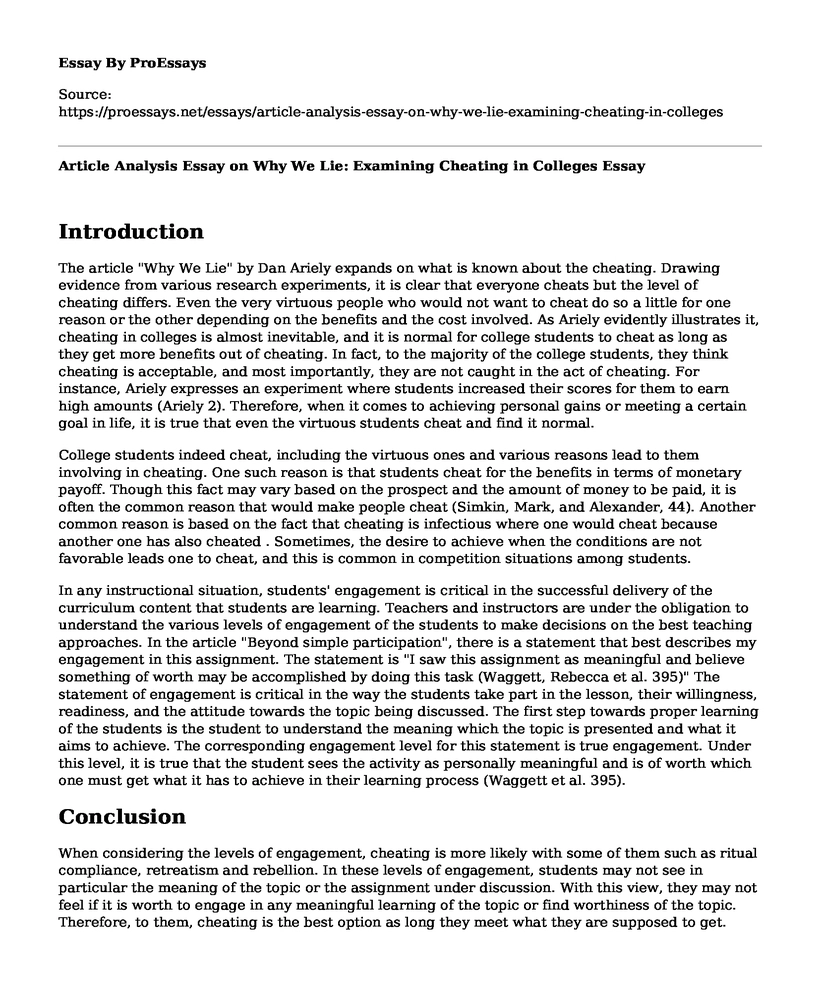Introduction
The article "Why We Lie" by Dan Ariely expands on what is known about the cheating. Drawing evidence from various research experiments, it is clear that everyone cheats but the level of cheating differs. Even the very virtuous people who would not want to cheat do so a little for one reason or the other depending on the benefits and the cost involved. As Ariely evidently illustrates it, cheating in colleges is almost inevitable, and it is normal for college students to cheat as long as they get more benefits out of cheating. In fact, to the majority of the college students, they think cheating is acceptable, and most importantly, they are not caught in the act of cheating. For instance, Ariely expresses an experiment where students increased their scores for them to earn high amounts (Ariely 2). Therefore, when it comes to achieving personal gains or meeting a certain goal in life, it is true that even the virtuous students cheat and find it normal.
College students indeed cheat, including the virtuous ones and various reasons lead to them involving in cheating. One such reason is that students cheat for the benefits in terms of monetary payoff. Though this fact may vary based on the prospect and the amount of money to be paid, it is often the common reason that would make people cheat (Simkin, Mark, and Alexander, 44). Another common reason is based on the fact that cheating is infectious where one would cheat because another one has also cheated . Sometimes, the desire to achieve when the conditions are not favorable leads one to cheat, and this is common in competition situations among students.
In any instructional situation, students' engagement is critical in the successful delivery of the curriculum content that students are learning. Teachers and instructors are under the obligation to understand the various levels of engagement of the students to make decisions on the best teaching approaches. In the article "Beyond simple participation", there is a statement that best describes my engagement in this assignment. The statement is "I saw this assignment as meaningful and believe something of worth may be accomplished by doing this task (Waggett, Rebecca et al. 395)" The statement of engagement is critical in the way the students take part in the lesson, their willingness, readiness, and the attitude towards the topic being discussed. The first step towards proper learning of the students is the student to understand the meaning which the topic is presented and what it aims to achieve. The corresponding engagement level for this statement is true engagement. Under this level, it is true that the student sees the activity as personally meaningful and is of worth which one must get what it has to achieve in their learning process (Waggett et al. 395).
Conclusion
When considering the levels of engagement, cheating is more likely with some of them such as ritual compliance, retreatism and rebellion. In these levels of engagement, students may not see in particular the meaning of the topic or the assignment under discussion. With this view, they may not feel if it is worth to engage in any meaningful learning of the topic or find worthiness of the topic. Therefore, to them, cheating is the best option as long they meet what they are supposed to get. Under rebellion, students way cheat in the assignment regardless of the outcome of cheating. So, to them, whether they get the feedback for the assignment or not, it is not of much worthiness.
Works Cited
Ariely, Dan. "Why we lie." Wall Street Journal (2012): C1-2.
Simkin, Mark G., and Alexander McLeod. "Why do college students cheat?." Journal of Business Ethics 94.3 (2010): 441-453.
Waggett, Rebecca J., Patricia Johnston, and Leslie B. Jones. "Beyond simple participation: Providing a reliable informal assessment tool of student engagement for teachers." Education 137.4 (2017): 393-397.
Cite this page
Article Analysis Essay on Why We Lie: Examining Cheating in Colleges. (2023, Jan 30). Retrieved from https://proessays.net/essays/article-analysis-essay-on-why-we-lie-examining-cheating-in-colleges
If you are the original author of this essay and no longer wish to have it published on the ProEssays website, please click below to request its removal:
- Technological Tools in Learning
- Personal Statement Example
- A Discussion of the Teaching Experience and Observations Paper Example
- Essay Example: What Is Home? My Perspective on the Meaning
- A Letter for Best Friend Paper Example
- Essay on Helping Low-Income Students Overcome Poverty: A Comprehensive Approach
- Essay on Promoting Wellness & Wellbeing in Early Childhood: Identifying Socialisation Influences & Strategies







